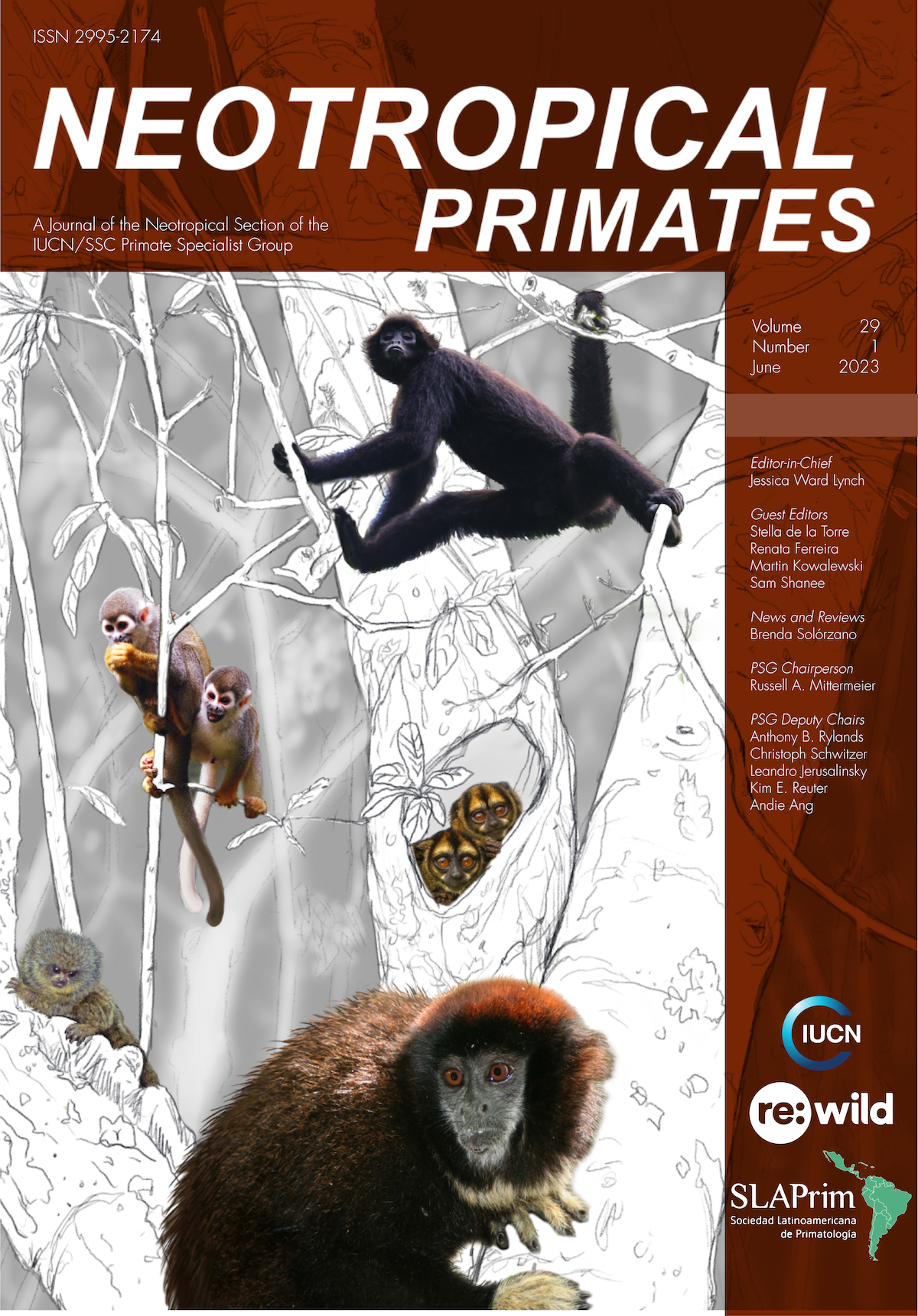Mulheres pela Primatologia: a Brazilian social movement promoting women in science and primate conservation
DOI:
https://doi.org/10.62015/np.2023.v29.772Keywords:
conservation, women scientists, women empowermentAbstract
Mulheres pela Primatologia (Women for Primatology) is a Brazilian social movement in support of women in science and the conservation of non-human primates. Activities occur through collaborative and interdisciplinary communication of women scientists of different ages, regions and origins. The objectives of the movement are to discuss gender equity, encourage representation in science, emphasize the importance of women’s role in primatology, and inspire other women to enter into scientific careers. The movement’s activities began in June 2021 with the creation of an Instagram profile that published information about women in science, primates, the representation of women, the history of women in primatology, interviews with distinguished primatologists, and events, among others. The activities presented here were developed between June 2021 and August 2022. As of August 2022, the profile @mulherespelaprimatologia had 2,349 followers, 126 publications and 2,044 comments, reaching 8,645 accounts, with 5,479 interactions recorded. Mulheres pela Primatologia is linked to the Jane Goodall Institute’s Roots & Shoots’ international network. In March 2022, the Youtube channel was created to broadcast three online events, with both young and established primatologists. The Guia Primatólogas do Brasil (Guide to Brazilian Women Primatologists) was created to democratize access to contact with women primatologists working in Brazil as advisors in graduate programs. The first edition of the guide featured 25 primatologists whose areas of expertise are behavior, ecology, conservation, physiology, ethnozoology, genetics, and environmental education. The performance and actions of Mulheres pela Primatologia have resulted in diverse products that range from scientific dissemination to support and encouragement for young primatologists, reinforcing women’s empowerment in primatology.
References
Avolio, B., Chávez, J. and Vílchez-Román, C. 2020. Factors that contribute to the underrepresentation of women in science careers worldwide: a literature review. Soc. Psychol. Educ. 23: 773–794. https://doi.org/10.1007/s11218-020-09558-y.
Bezerra, G., Lazzaro, D., Peixoto, A., Lopes, M. M., An- drade, C. H., Lopes, H. J. N. and Barbosa, M. C. 2019. Female Researchers in Science in Brazil: the Scissors Effect. In: La Brecha de Género en Matemática, Computación y Ciencias Naturales, L. M. Montes and Dawson, S. P. (eds.), pp.55–67. S.P. Sociedad Mexicana de Fisica, Ciudad de México.
Bian, L., Leslie, S. J. L. and Cimpian, A. 2017. Gender stereotypes about intellectual ability emerge early and influence children’s interests. Science 355: 389–391. https://doi.org/10.1126/science.aah6524.
Diele-Viegas, L. M., Cordeiro, T. E. F., Emmerich, T. Hi- pólito, J., Queiroz-Souza, C., Sousa, E., Vancan, A. C. and Leite, L. 2021. Potential solutions for discrimination in STEM. Nat. Hum. Behav. 5: 672–674. https://doi.org/10.1038/s41562-021-01104-w.
Diele-Viegas, L. M., de Almeida, T. S., Amati-Martins, I., Bacon, C. D., Silva, C. C., Collevatti, R. G., Fenker, J., Cordeiro, T. E.F., Ferrari, G. C. P., Franco, A. C. S., Gas- paretto, L. F., Hipólito, J., Hohlenwerger, C., Hörmanseder, B., de Jesus, P. B., Matos, S. S., Pareja-Mejía, D., Murer, B. M., Pavone, C. B., Pilecco, F. B., Queiroz-Sou- za, C., Reis, A., Santana, P. C., Dias-Silva, L., Souza, L., Telles, M. P. C., Viaggi, J. and Virginio, F. 2022. Community voices: sowing, germinating, flourishing as strategies to support inclusion in STEM. Nature 13: 1–5. https://doi.org/10.1038/s41467-022-30981-6.
Eaton, A. A., Saunders, J. F. and West, K. 2019. How gender and race stereotypes impact the advancement of scholars in STEM: professors’ biased evaluations of physics and biology post-doctoral candidates. Sex Roles 82: 127–141. https://doi.org/10.1007/s11199-019-01052-w.
FAPESP. 2017. A sombra do assédio na integridade da ciência. Fundação de Amparo à Pesquisa do Estado de São Paulo (FAPESP), São Paulo. Website: https://revistapesquisa.fapesp.br/a-sombra-do-assedio-na-integridade-da-ciencia/. Accessed on 21 August 2022.
Ferreira, L. 2018. Menos de 3% entre docentes da pós-graduação, doutoras negras desafiam racismo na academia. Gênero e Número, Brasil. Website: http://www.generonumero.media/menos-de-3-entre-docentes-doutoras-negras-desafiam-racismo-na-academia/. Acessada em 28 de janeiro de 2023.
Ferreira, C. A. and Machado, C. V. 2022. Dossiê Temático: Mulheres e Meninas na Ciência. Fundação Oswaldo Cruz (FIOCRUZ), Rio de Janeiro.
IBGE. 2010. Censo Brasileiro de 2010. Instituto Brasileiro de Geografia e Estatística (IBGE), Rio de Janeiro. Website: https://censo2010.ibge.gov.br/. Accessed on 21 August 2022.
Instituto Avon. 2015. Violência contra a mulher no ambiente universitário. São Paulo. Website: https://dossies.agenciapatriciagalvao.org.br/dados-e-fontes/pesquisa/violencia-contra-a-mulher-no-ambiente-universitario-data-popularinstituto-avon-2015/. Accessed on 21 August 2022.
Machado, L. S., Rosa e Silva, L. K., Ricachenevsky, F. K., Perlin, M., Schwartz, I. V. D., Neis, A. T., Soletti, R. C., Seixas, A. and Staniscuaski, F. 2019. Parent in science: the impact of parenthood on the scientific career in Brazil. In: IEEE/ACM 2nd International Workshop on Gender Equality in Software Engineering (GE), pp.37- 40. Montreal. https://doi.org/10.1109/GE.2019.00017.
Morgan, A. C., Way, S. F., Hoefer, M. J. D., Larremore, D. B., Galesic, M. and Clauset, A. 2021. The unequal impact of parenthood in academia. Sci. Adv. 7: 1–8. https://doi.org/10.1126/sciadv.abd1996.
Navas, A. L. G. P., Berti, L., Trindade, E. R. and Lunardelo P. P. 2020. Divulgação científica como forma de compartilhar conhecimento. CoDAS 32: 1–3. https://doi.org/10.1590/2317-1782/20192019044.
Strier, K. B. 1987. Ranging behavior of woolly spider monkeys, or muriquis, Brachyteles arachnoides. Int. J. Primatol. 8: 575–591. https://doi.org/10.1007/BF02735778.
Strier, K. B. 1999. Faces in the Forest: The Endangered Muriqui Monkeys of Brazil. Harvard University Press.
Strier, K. B. 2000. Population viabilities and conservation implications for muriquis (Brachyteles arachnoides) in Brazil’s Atlantic Forest. Biotropica 32: 903–913. https://www.jstor.org/stable/2663927.
Strier, K. B. 2019. Everything for the muriquis: reflections from a long-term field study on a critically endangered primate. Bol. Soc. Bras. Mastozool. 85: 117–127.
Strier, K. B. and Boubli, J. P. 2006. A history of long-term research and conservation of northern muriquis (Brachyteles hypoxanthus) at the Estação Biológica de Caratinga/RPPN-FMA. Primate Conserv. 20: 53–63. https://doi.org/10.1896/0898-6207.20.1.53.
Zandonà, E. 2022. Female ecologists are falling from the academic ladder: A call for action. Perspect. Ecol. Conserv. 20: 294–299. https://doi.org/10.1016/j.pecon.2022.04.001.

Downloads
Published
Issue
Section
License

This work is licensed under a Creative Commons Attribution-NonCommercial-ShareAlike 4.0 International License.


